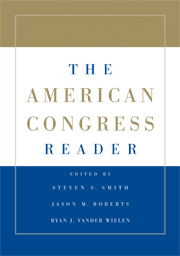Book contents
- Frontmatter
- Contents
- THE AMERICAN CONGRESS READER
- PART I THE AMERICAN CONGRESS: MODERN TRENDS
- 1 What Is Wrong with the American Political System?
- 2 A Reassessment of Who's to Blame
- 3 Between the Campaigns
- PART II REPRESENTATION AND LAWMAKING IN CONGRESS: THE CONSTITUTIONAL AND HISTORICAL CONTEXT
- PART III CONGRESSIONAL ELECTIONS AND POLICY ALIGNMENTS
- PART IV MEMBERS, GOALS, RESOURCES, AND STRATEGIES
- PART V PARTIES AND LEADERS
- PART VI THE STANDING COMMITTEES
- PART VII THE RULES OF THE LEGISLATIVE GAME
- PART VIII THE FLOOR AND VOTING
- PART IX CONGRESS AND THE PRESIDENT
- PART X CONGRESS AND THE COURTS
- PART XI CONGRESS, LOBBYISTS, AND INTEREST GROUPS
- PART XII CONGRESS AND BUDGET POLITICS
- PART XIII FURTHER READINGS ON CONGRESSIONAL POLITICS
- References
2 - A Reassessment of Who's to Blame
A Positive Case for the Public Evaluation of Congress
Published online by Cambridge University Press: 05 June 2012
- Frontmatter
- Contents
- THE AMERICAN CONGRESS READER
- PART I THE AMERICAN CONGRESS: MODERN TRENDS
- 1 What Is Wrong with the American Political System?
- 2 A Reassessment of Who's to Blame
- 3 Between the Campaigns
- PART II REPRESENTATION AND LAWMAKING IN CONGRESS: THE CONSTITUTIONAL AND HISTORICAL CONTEXT
- PART III CONGRESSIONAL ELECTIONS AND POLICY ALIGNMENTS
- PART IV MEMBERS, GOALS, RESOURCES, AND STRATEGIES
- PART V PARTIES AND LEADERS
- PART VI THE STANDING COMMITTEES
- PART VII THE RULES OF THE LEGISLATIVE GAME
- PART VIII THE FLOOR AND VOTING
- PART IX CONGRESS AND THE PRESIDENT
- PART X CONGRESS AND THE COURTS
- PART XI CONGRESS, LOBBYISTS, AND INTEREST GROUPS
- PART XII CONGRESS AND BUDGET POLITICS
- PART XIII FURTHER READINGS ON CONGRESSIONAL POLITICS
- References
Summary
Brady and Theriault argue that there are things legislators do that bring public disapproval upon their institution. Legislators devise procedures to avoid accountability, engage in hyperbolic rhetoric, and blame their own institution. Moreover, extremists in Congress get disproportionate media coverage so that the public sees more conflict and partisanship than actually exists.
That Americans disapprove of Congress is generally as well accepted as any stylized fact in American politics. From 1974 (when Gallup first asked a congressional approval question) through 1997, congressional approval hovered around 30 percent. The average for 54 Gallup polls taken over the 23 years was 31 percent. At no point did a majority of Americans approve of the way Congress did its job – approval climaxed in 1974 at 48 percent amid the Watergate proceedings. Such bleak numbers led Glenn Parker to conclude, “Congress, like Prometheus, is inevitably doomed to suffer indignities.” Sometimes, however, stylized facts turn out to be fiction. In 1998, Congress enjoyed widespread popular support, reaching a high of 63 percent in late September. Notwithstanding Congress' current popularity, the causes and consequences of the American public's disapproval of Congress have been studied in classrooms.
The myriad opinions and explanations of low congressional approval can generally be broken down into two schools of thought. The first argues that the American public's disapproval of Congress is based on policy or conditions. Low congressional approval is an artifact of either a recessing economy or policies inconsistent with the public's preferences.
- Type
- Chapter
- Information
- The American Congress Reader , pp. 7 - 15Publisher: Cambridge University PressPrint publication year: 2008



